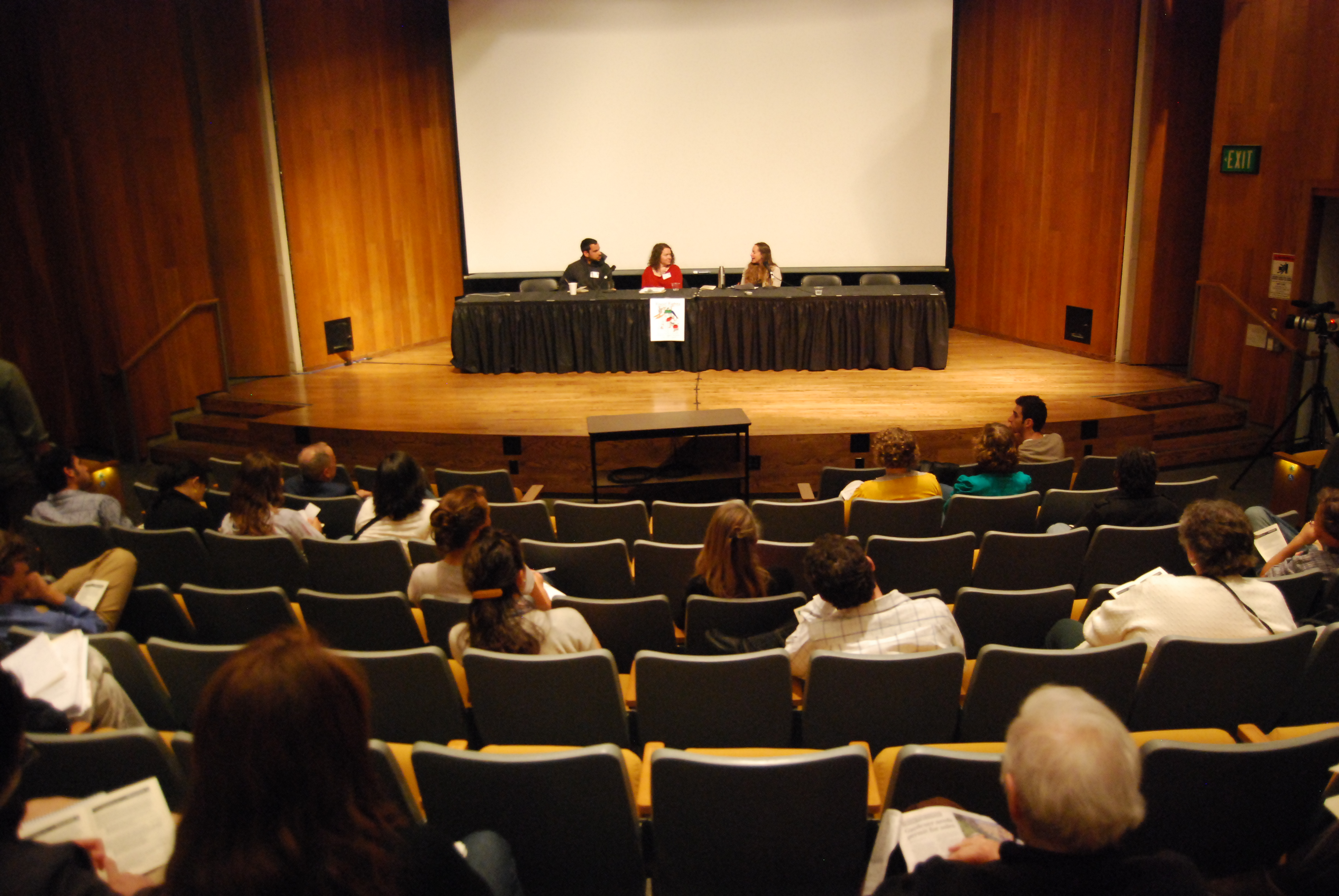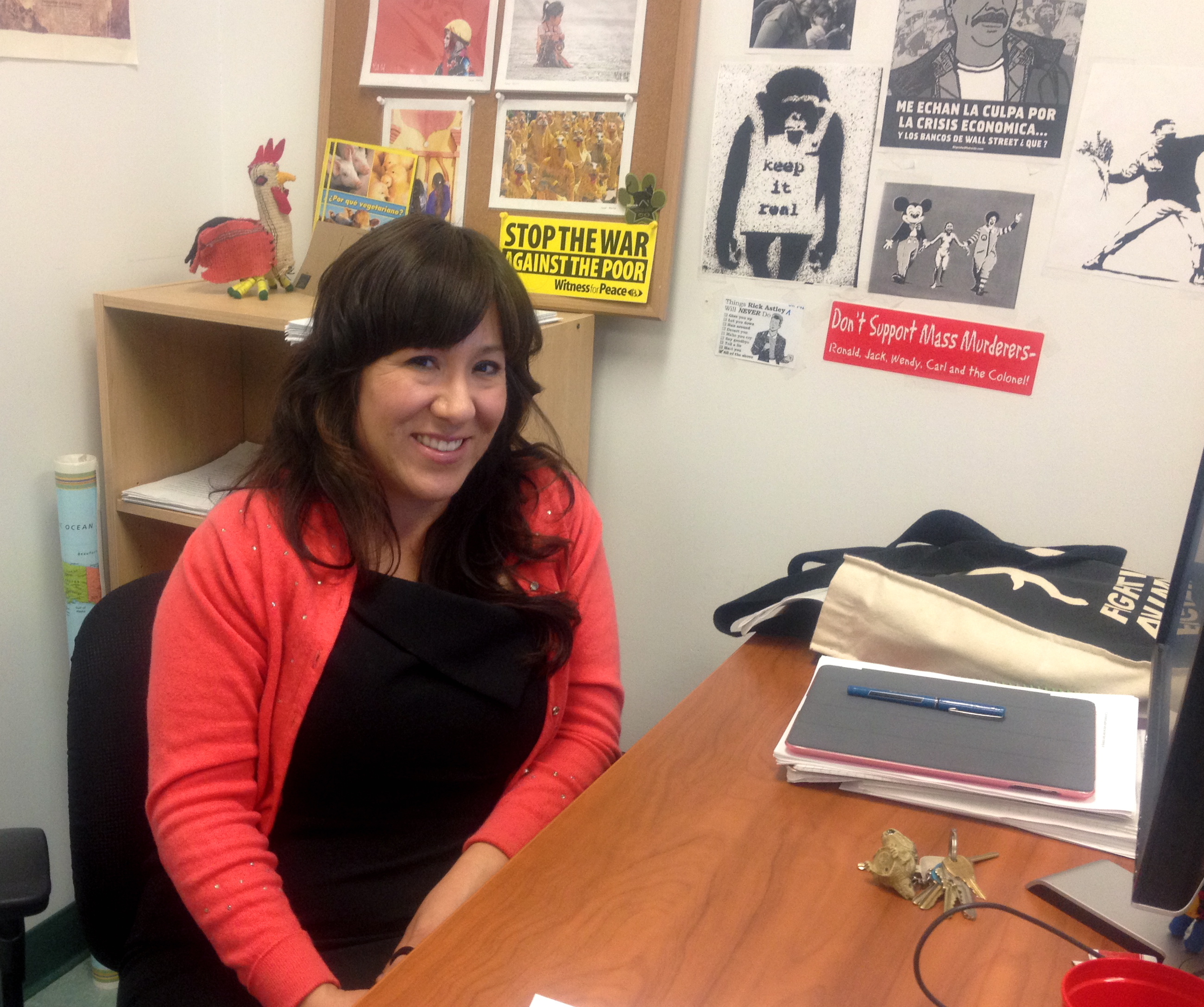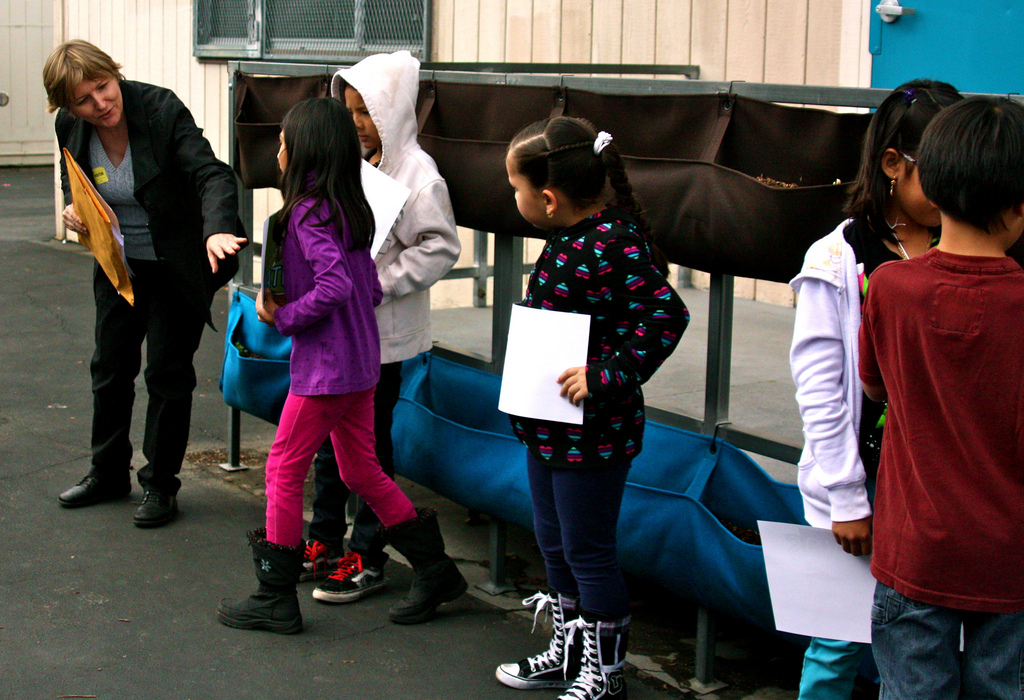In April, over 20 panelist from across Northern California gathered at the Oakland Museum of California to discuss, share ideas, transfer knowledge and empower food justice advocates.

Founders of community gardens in Norther California came together at a food justice panel in Oakland to advocate for cause. Sigourney B. Nuñez/EL NUEVO SOL
Sigourney B. Nuñez
EL NUEVO SOL
Several cities across Northern California are implementing urban farms to increase food security and access to healthy food in low-income communities. According to community gardeners, urban farms create awareness about the importance of fresh and local food. They connect communities to how their food is produced. Urban farms also have potential to better reflect and serve the food justice cause through strength in diversity.
Veggielution- San Jose, Calif.
Over five decades ago, Emma Prusch was born and raised in a large dairy farm that was maintained by her family for generations. By 1962, Prusch was the only living heir of the 86-acre land. She bequeathed the farm to the city of San Jose under the condition that it would keep its original rural-country atmosphere; Emma Prusch Farm Park was erected.
Within the park, 10 acres belong to Veggielution, an urban community garden program that was founded in the spring of 2008 by college students Mark Anthony Medeiros and Amie Frisch. Veggielution was created with hopes to build community, embrace diversity, empower the youth and create food sustainability.
Medeiros and Frisch said they were involved in different forms of activism during their undergraduate career at San Jose State University, where the two met. They wanted to grow their own food; they started with several small gardens in the community and incorporated the help of their college peers.
“At some point, local food and urban farming, educating people about sustainable agriculture, just sort of materialized as a good solution for all these problems,” Medeiros said. “We thought, ‘Maybe we should train ‘hella’ people to do some gardening and try to get a large diversity of people.’”
Around 10 a.m. every Saturday, about 80 Veggielution volunteers gather at Emma Prusch Farm Park to cultivate vegetables. The cohort of farmers is made up of youth, college students and elderly community members, all from a diverse ethnic background and age.
“They are all working together and managing a farm together,” Medeiros said. “They are taking home what they grow and are creating a little community economic system where people can grow food and provide a resource for themselves.”
Medeiros, the farm manager of the Veggielution said he appreciates the range in cultural background in his volunteers because they each offer different aspects to the food growing process. He also sees the program as a vehicle to grow a strong community. “There are a lot of immigrant folks who are from all over the place and bring lots of cool gardening practices to our garden,” he said. “Just getting all these different folks to interact together and learn skills that are inherent to all cultures and communities and share farming together and then sit down and break bread together and grow together as a community is really cool to me.
Last year, Veggielution grew over 15,000 pounds of produce, they anticipate successful farming season again and expect to grow 25,000 pounds of fresh food this year. “It’s a farm, so we want to provide low cost food to lots of people.” Medeiros said. Veggielution offers the grown crops to the San Jose community at inexpensive rates, said Medeiros.
Veggielution’s community garden grows collard greens, peas, cactus, corn, taro root, tomatoes, peppers among other seasonal vegetables when deemed appropriate. The program will continue efforts to pass on traditional farming techniques, now known as organic farming. “We want to reinitiate the transfer of knowledge to our community,” Medeiros said.
City Slicker Farms- West Oakland, Calif.
Ten years ago, Barbara Finnin, a Philadelphia native settled in West Oakland to address food justice, primarily for the low-income community of color.
Finnin describes the city of West Oakland as a food desert; she says corner liquor stores or other markets that do not promote healthy food surround the neighborhood. Most of the edible items sold are caloric based food rather than nutrient dense food, according to Finnin.
“You might get a potato, you might get an onion and maybe an apple, but you don’t have access to a lot of produce,” Finnin said. “If when in your own neighborhood you can’t get the food that you need to live a healthy life, that’s what we call a human rights issue.”
The city of West Oakland is notorious for their diesel emissions; gas discharge is 90 times higher than anywhere in California, Finnin said. She said around town, people could find an old industry that is still polluting the neighborhoods, as well as abandoned buildings that were once striving businesses.
These realities lead Finnin to take part in advocacy by joining City Slicker Farms, where she currently serves as director. By starting backyard gardens and urban farms around the community, the program was created to empower the community members of West Oakland to meet immediate basic needs for healthy and organic food.
“We want the community to grow their own food and get nutrition and get what they need to be healthy in their lives,” Finnin said.
Since the start of City Slicker Farms in 2001, the program consists of seven Community Market Farm Stands, a greenhouse in conjunction with the Oakland Unified School District and Urban Farming Education programs.
In the Community Market program, the groups go to former vacant lots and transform them into produce growing areas. Before they can dub the area suitable for farming, they test the soil- a process that needs to take place in an urban area where most of their soil problems lead to issues with lead.
The soil, if contaminated puts children at hight risk for side effects like developmental issues, Finnin said. “Lead can affect the growth of a child’s brain and body and prohibit them from getting nutrients into the system,” she said. “We want to make sure that people are gardening safely, it’s a great educational moment.”
If a former industrialized space gets renovated as sustainable, then lettuce, tomatoes, squash and all seasonal vegetables are grown. Chickens, eggs and when available honey, are also distributed in the West Oakland. “No one get’s turned away for lack of funds,” Finnin said.
In the greenhouse, City Slickers were able to grow over 26,000 plants last year and were able to allocate profit for their flora.
As of 2005, City Slickers also planted backyard gardens with over 170 families in the West Oakland area. According to Finnin, City Slickers started this because of community members approached the group for help.
“They said they wanted to learn the food traditions that have been in their families. We are partnering with folks that grow their own food and put it on their own table,” Finnin said. “This is nothing new, this is something that people stopped doing decades ago.”
For Finnin, this was important to implement because she said over half the population in West Oakland does not own a car. “Getting to a grocery store outside your community takes a lot of time,” Finnin said. “If you are doing that only once or twice a month, getting fresh produce is hard.”
City Slicker Farms work toward creating a long-term sustainable impact in underutilized urban areas in West Oakland. “There’s a long legacy of people saying we don’t have access to food, lets do something about it,” Finnin said.
Tags: City Slicker Farms community gardens food justice Green House Oakland Oakland Museum of California San Jose Sigourney Nunez Veggielution














